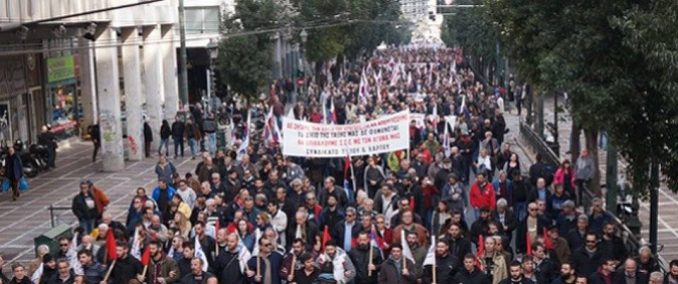Strikes in Greece defend workers’ right
 At the call of the All Workers Militant Front (PAME), a labor federation affiliated with the Greek Communist Party, there was a general strike Jan. 12. This was the Friday before the parliamentary vote on a proposal to limit the right to strike. As lawmakers debated, protesters from PAME chanted “Hands off strikes!” during a march of about 20,000 people. Others held banners reading “Uprising!” and “No to modern slavery!”
At the call of the All Workers Militant Front (PAME), a labor federation affiliated with the Greek Communist Party, there was a general strike Jan. 12. This was the Friday before the parliamentary vote on a proposal to limit the right to strike. As lawmakers debated, protesters from PAME chanted “Hands off strikes!” during a march of about 20,000 people. Others held banners reading “Uprising!” and “No to modern slavery!”
Workers protested because, to get the latest and last portion of the bailout from international banks, the Greek parliament had to agree to limit the right to strike, extend electronic auctions and seizures for tax and social security debts, and make cuts to child and disability benefits.
In December 2017, when the proposal to limit strikes first came before the Greek parliament, PAME held a nationwide general strike on Dec. 14. It was called “a combative and loud response against the attempt of the government, the employers and the EU to smash the life of the working class and the peoples for the sake of the profits of capital.”
On Jan. 15, the day of the vote, there was a strike by ADEDY (the Confederation of Civil Servants), the largest union of public-sector workers. They shut down mass transit in Athens.
It is clear that the unions in Greece are defending the right to strike by striking. Given all the pain and losses they have suffered over the past 8 years, they are in no mood to accept the latest attacks quietly.
Since Greece entered a financial crisis in 2010, its unions have called about 50 one-day general strikes to fight blatant attacks on workers’ living standards and lives. Farmers, the self-employed and retirees, who were also severely impacted by cuts in health care and other social services, often supported those strikes.
Most of the strikes lasted one day. The short duration led the Greek and European bourgeoisie to discount their strength and impact. Production would quickly recover; a day of stoppage now and then would hurt little.
The bailout program is set to end in August 2018. After that Greece must finance itself by selling government bonds instead of arranging support through the European Union. If the Greek government enters the open loan market, the loss of productivity from all these strikes will be more important to the Greek ruling class. >

